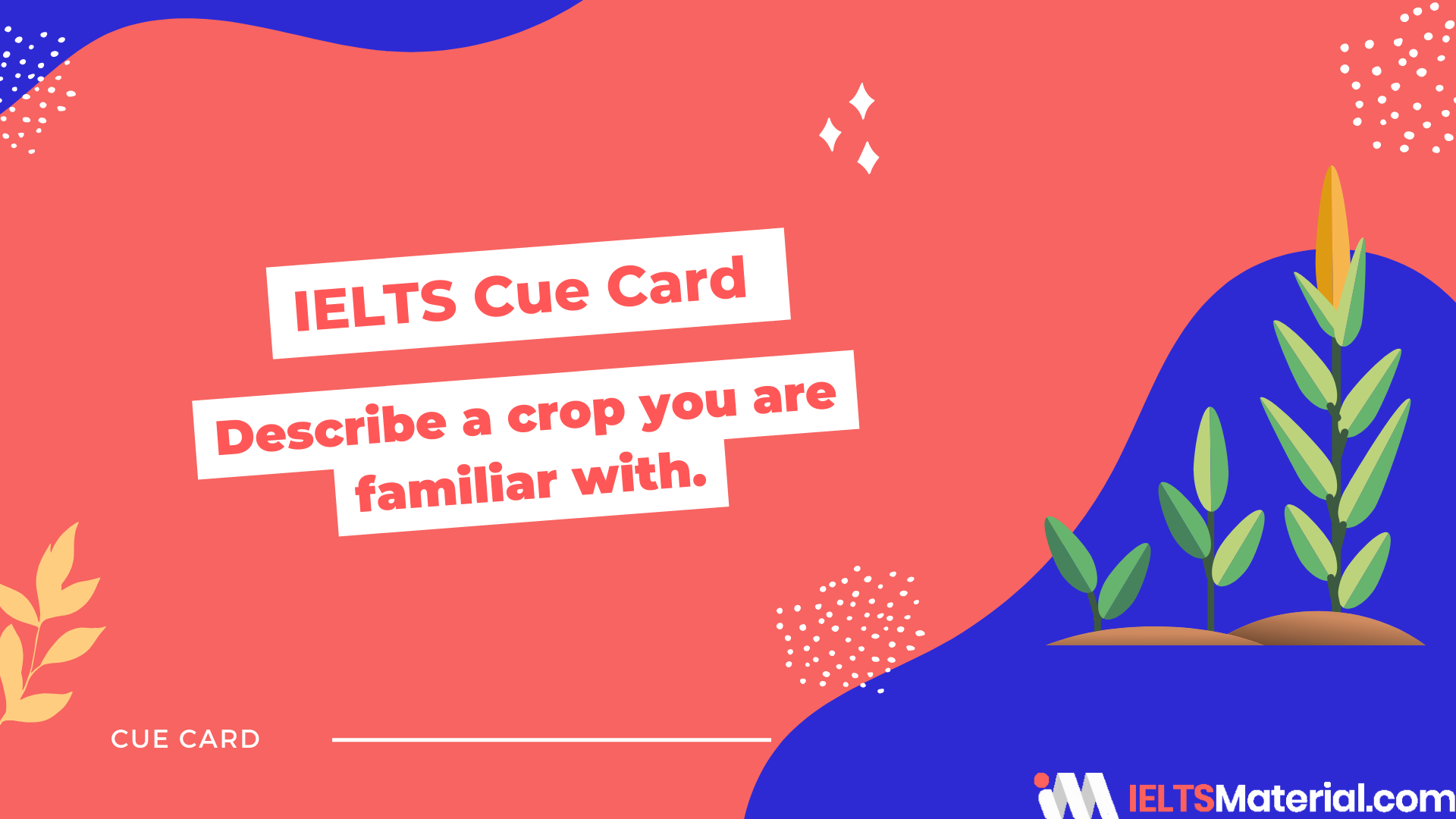Describe a crop you are familiar with – IELTS Cue Card
Table of Contents

Limited-Time Offer : Access a FREE 10-Day IELTS Study Plan!
In the IELTS Speaking test, the Cue Card section presents candidates with random topics, challenging them to think on the spot. Each candidate has one minute to gather their thoughts before speaking for 2 minutes.
This section evaluates a candidate’s confidence and speaking ability. One such topic is “Describe a Crop You are Familiar With,” which assesses the candidate’s knowledge of agricultural aspects.
For more Cue Cards, take a look at IELTS Speaking Part 2 | Topics, Questions, and Samples Answers.
Part 2
Describe a crop you are familiar with. You should say:
-
What crop is it?
-
How did you become familiar with it?
-
How is it grown and harvested?
Band 6 Sample Answer
I would like to talk about rice, a crop that I am quite familiar with. Rice is a staple food in many parts of the world, and I have been exposed to it since my childhood.
I became familiar with rice because it is a major part of my daily diet. Being from a region where rice is the primary staple, it is almost impossible not to be familiar with it. From a very young age, I saw my parents and grandparents cooking and serving rice for our meals. I remember watching them wash and cook the rice, and I was often given the task of helping with the washing process. This hands-on experience made me quite familiar with the crop.
Rice is typically grown in flooded fields called rice paddies. It requires a lot of water to grow, and the fields are usually filled with water to a certain depth. The seeds are sown in the wet soil, and as they grow, they become the green rice plants that we commonly see. When the rice grains are fully ripe, they turn golden in color, indicating that they are ready to be harvested. Harvesting is done either manually or with the help of machines, depending on the scale of cultivation. In my region, it’s common to see farmers working in the fields, cutting the rice plants with sickles and then threshing the grains to separate them from the husk.
Band 9 Sample Answer
The crop I am intimately familiar with is coffee, particularly Arabica coffee. My knowledge of coffee began through my family’s long-standing involvement in coffee farming, and it has grown over the years as I actively participated in the cultivation and processing of coffee beans.
My family has been in the coffee farming business for generations, so I was exposed to coffee from a very young age. I remember accompanying my grandparents to their coffee plantations during school vacations. They would teach me about the different varieties of coffee plants, how to care for them, and the intricate process of transforming coffee cherries into the aromatic beverage we all enjoy.
Arabica coffee is typically grown in regions with specific climatic conditions, such as high altitudes and consistent rainfall. The coffee plants require meticulous care, including regular pruning, fertilization, and protection from pests. The cherries, which contain the coffee beans, take several months to ripen. They transition from green to bright red when fully ripe.
The harvest season is a crucial and exciting time in coffee farming. When the cherries are ready, they are handpicked, ensuring that only the ripest ones are selected. This labor-intensive process requires skilled pickers who are adept at discerning the perfectly ripe cherries. Once harvested, the cherries undergo a series of processing steps, including pulping, fermenting, drying, and milling, to extract the beans. Finally, the green coffee beans are roasted to perfection before they are ground and brewed.
Part 3 (Follow-up Questions)
Question: Describe a crop you are familiar with.
What are the common crops in your country?
Band 6 Answer: In my country, some of the common crops are rice, wheat, maize, and sugarcane. These crops are widely cultivated and play a significant role in our agriculture.
Band 9 Answer: In my country, which is known for its diverse agricultural practices, we cultivate a wide range of crops. Some of the most common ones include rice, wheat, maize, sugarcane, cotton, and various fruits and vegetables. The choice of crops often depends on the region’s climate and soil conditions.
Do you think traditional farming methods are still relevant today?
Band 6 Answer: Yes, I believe traditional farming methods still hold relevance today, especially for small-scale farmers. These methods are often more sustainable and environmentally friendly compared to modern industrial farming practices. They can also help preserve biodiversity.
Band 9 Answer: While modern farming techniques have revolutionized agriculture and significantly increased yields, traditional farming methods remain relevant, particularly in sustainable and organic farming practices. They often promote soil health, biodiversity, and the preservation of heirloom crop varieties. Therefore, they should not be disregarded in the pursuit of higher productivity.
How can technology benefit agriculture?
Band 6 Answer: Technology can benefit agriculture in various ways. For instance, modern machinery and equipment can increase productivity and efficiency on larger farms. Additionally, tools like weather forecasting and data analysis can help farmers make informed decisions about planting and harvesting.
Band 9 Answer: Technology has the potential to transform agriculture in numerous ways. Precision farming techniques, aided by drones and sensors, can optimize resource use and reduce waste. Genetic engineering can produce crops with enhanced resistance to pests and diseases. Furthermore, data-driven decision-making tools can empower farmers to adapt to changing climate conditions and market demands, ultimately leading to more efficient and sustainable agricultural practices.
Now that you’ve learned about the cue card “Describe a crop you are familiar with,” you know how you should approach such questions and answer them in a particular way with a detailed explanation.
You can find more such IELTS Cue Cards like “Describe a crop you are familiar with,” on our website – IELTS Speaking Cue Card Topics with Samples Answers (2023)
Also, check:

Start Preparing for IELTS: Get Your 10-Day Study Plan Today!
Recent Articles

Haniya Yashfeen

Kasturika Samanta

Nehasri Ravishenbagam





Post your Comments